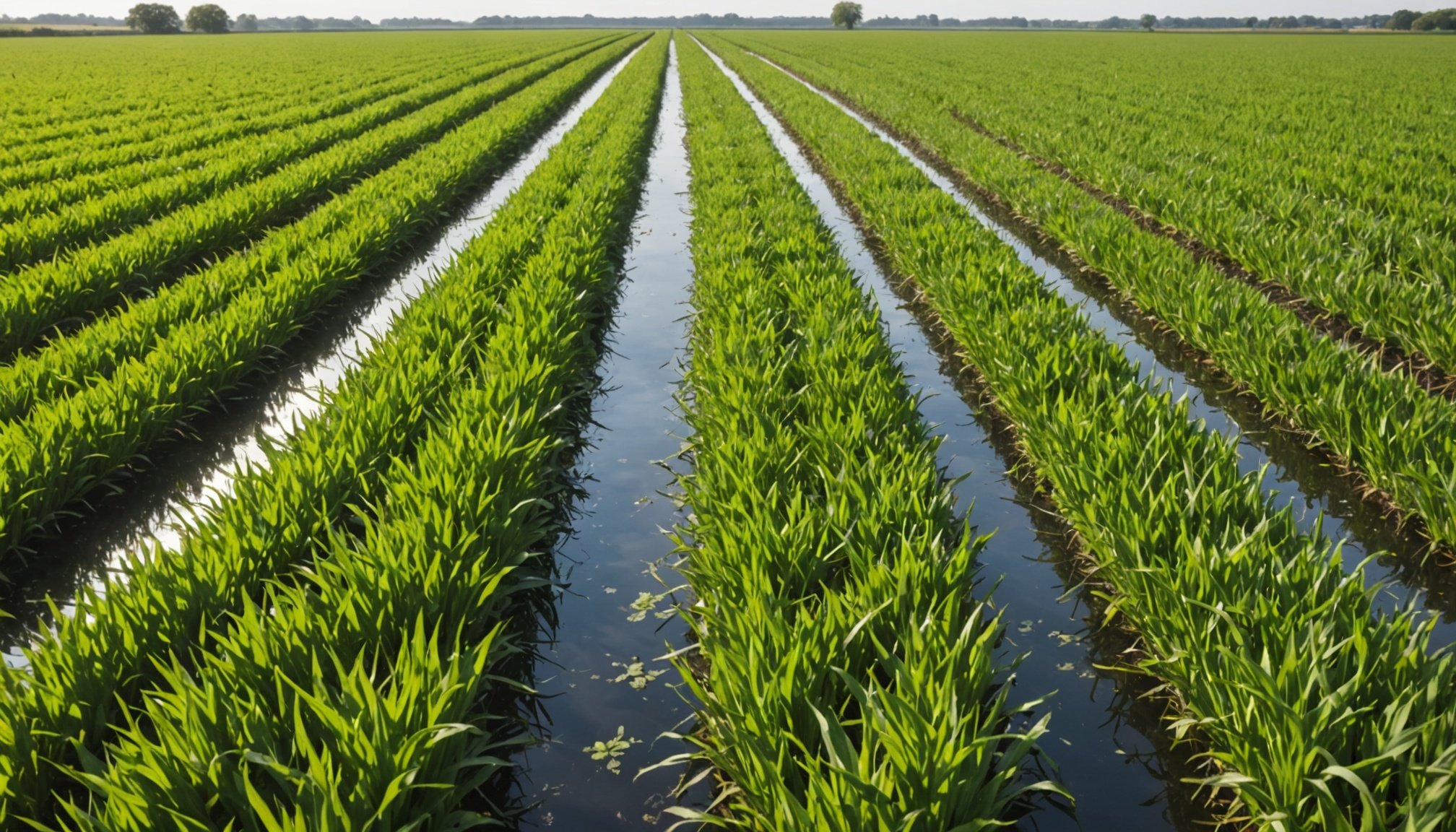Innovative Water Management Techniques
Incorporating eco-friendly water management into agriculture is pivotal for conserving resources and maintaining productivity. Drip irrigation is one notable technique, delivering water directly to plant roots. This reduces evaporation and ensures that crops receive optimal hydration while saving water. When paired with sustainable agricultural practices, such as rainwater harvesting, farms can significantly decrease their reliance on groundwater supplies. Rainwater harvesting captures and stores rain for future use, making it an ideal complement to drip irrigation by providing a renewable water source.
Precision agriculture plays a crucial role in enhancing these practices, leveraging data and technology to optimise water usage. Through sensors and smart systems, farmers can monitor soil moisture levels and adjust irrigation accordingly, ensuring that crops only receive what they need. This not only conserves water but also boosts yield quality and quantity.
In parallel : Unlock your website’s potential with an nyc seo agency
Several UK farms have successfully implemented these eco-friendly water management methods, achieving remarkable results. For instance, some farms in the South East have incorporated drip irrigation systems and rainwater harvesting, leading to a 20% reduction in water consumption. By embracing these innovative techniques, farmers can sustainably manage their resources, thereby promoting environmental stewardship and ensuring agricultural resilience.
Case Studies of Successful Implementations
Case studies provide a vivid understanding of how theoretical concepts have been effectively put into practice. They become blueprints for others aiming to adopt similar sustainable agriculture projects, particularly in the realm of sustainable water management.
Additional reading : Strategies for Incorporating Biodegradable Materials in UK Automotive Production
Detailed Analysis of a UK Farm Utilizing Sustainable Practices
One UK farm has embraced sustainable practices, yielding promising results. Through strategic implementation, they have transitioned from conventional water use to a more eco-friendly approach. This shift has not only conserved water but has also enhanced soil quality and biodiversity. Careful monitoring and innovative technology were pivotal in tailoring irrigation to the precise needs of the crops, illustrating the importance of precision in sustainable farming.
Comparison of Traditional vs. Eco-Friendly Water Management
Traditional water management often involves methods that are both resource-intensive and environmentally taxing. In contrast, this farm has adopted eco-friendly techniques such as rainwater harvesting and drip irrigation. While the former method typically leads to excessive water usage, the latter efficiently directs water directly to the root zones, reducing waste significantly.
Outcomes and Improvements in Crop Yield and Water Savings
The impact of these methods is evident through measurable improvements. Crop yields have notably increased due to heightened soil health and sustained hydration. Additionally, the farm reports a substantial reduction in water consumption, underscoring the financial and environmental benefits of sustainable practices. Such outcomes serve as a compelling case for the adoption of sustainable agriculture.
Emerging Technologies in Water Management
In recent years, technology in agriculture has radically transformed water management, particularly through smart irrigation systems. These systems are equipped with sensors and controllers that adjust watering schedules based on real-time environmental data, ensuring efficient use of water resources and reducing waste.
The integration of IoT (Internet of Things) devices has further enhanced these efforts. By connecting various sensors and systems, IoT devices provide continuous monitoring and management, allowing for precise water distribution tailored to specific crop needs. This also allows farmers to receive actionable insights remotely, optimizing resource allocation.
One of the most promising water conservation innovations is the development of advanced water recycling technologies. These innovations allow for the reuse of greywater and other non-potable water sources, which can significantly reduce the demand on freshwater supplies. Techniques such as membrane filtration and bioreactor systems are leading the way, offering more sustainable solutions for both agricultural and urban water needs.
Together, these technological advancements are redefining water management practices, promoting sustainability, and ensuring that precious water resources are preserved for future generations. As global demand for water continues to rise, such innovations in technology in agriculture and water conservation will become increasingly vital.
Policy and Regulatory Frameworks
The UK government has been proactive in establishing agriculture policies aimed at promoting sustainable practices. Key initiatives include subsidies for farmers adopting eco-friendly measures, designed to balance agricultural productivity with environmental preservation. These policies encourage the reduction in chemical fertilisers, promoting organic methods and efficient use of resources. Furthermore, the government offers guidance on sustainable water management as part of its broader eco-agenda, ensuring water resources are used judiciously and pollution is minimized.
On the larger scale, EU regulations play a significant role in shaping sustainable water regulations across member countries, including the UK. The Water Framework Directive mandates member states to achieve good qualitative and quantitative status of all water bodies. This directive necessitates that agricultural practices consider long-term impacts on water availability and quality. Although the UK has exited the EU, this framework continues to influence its policies due to established precedents.
Looking ahead, potential future policies in the UK could place greater emphasis on integrating technology in agriculture. Such initiatives might focus on the precision application of resources, adoption of water recycling techniques, and further development of digital tools for real-time monitoring of environmental impacts, ultimately enhancing the nation’s commitment to eco-friendly practices.
Challenges in Implementing Sustainable Practices
When it comes to integrating sustainable practices, farmers often face numerous hurdles. Among these are challenges in water management and other barriers to adoption that can slow progress.
Financial Constraints and Funding Opportunities
One of the most prominent challenges is financial constraints. Implementing sustainable practices often requires upfront investment in new technology or infrastructure, which can be daunting for many. Moreover, accessing capital can be complicated by existing debts or limited cash flow. Despite these challenges, there are funding opportunities available. Many governments and NGOs offer grants or low-interest loans to encourage sustainable initiatives. Farmers are encouraged to explore these avenues thoroughly, as they can potentially alleviate financial burdens significantly.
Technical Knowledge Gaps Among Farmers
Another major hurdle is the lack of technical knowledge. Sustainable practices often involve new techniques or technologies unfamiliar to many in the agriculture sector. This knowledge gap can hinder adoption rates, as farmers may feel ill-equipped to implement changes. Providing accessible training programs and resources is crucial for overcoming this barrier. These educational efforts not only build confidence but also ensure that sustainable practices are implemented effectively.
Resistance to Change and Cultural Factors in Agriculture
Cultural factors can play a pivotal role in resistance to change. Agriculture is deeply rooted in tradition, making any shift toward sustainability challenging. However, initiatives promoting awareness and dialogue among farming communities can facilitate smoother transitions, emphasizing the long-term benefits of sustainable practices.
Actionable Recommendations for Stakeholders
The transition to eco-friendly practices in agriculture involves several practical strategies. Farmers can start by implementing crop rotation and integrated pest management to reduce reliance on chemical inputs. These practices not only enhance soil health but also increase biodiversity, consequently improving resilience to pests.
Collaborating with government and NGOs is vital. Farmers should seek partnership opportunities that offer financial incentives, technical support, and knowledge sharing. Government grants for sustainable farming and NGO-led programs provide resources that can alleviate the costs associated with the transition. Establishing a network with peer farms can also facilitate knowledge exchange, making the adoption smoother.
Continuously engaging in education and training programs is crucial as well. These programs can enhance farmers’ understanding of best practices and emerging technologies. Workshops, webinars, and on-field demonstrations provide hands-on experience and theoretical knowledge crucial for eco-friendly farming.
By adopting these steps, farmers not only contribute to a more sustainable environment but can also enjoy long-term economic benefits through premium markets and reduced input costs. Embracing change with a strategic approach ensures that farmers remain competitive and resilient in an evolving agricultural landscape.











